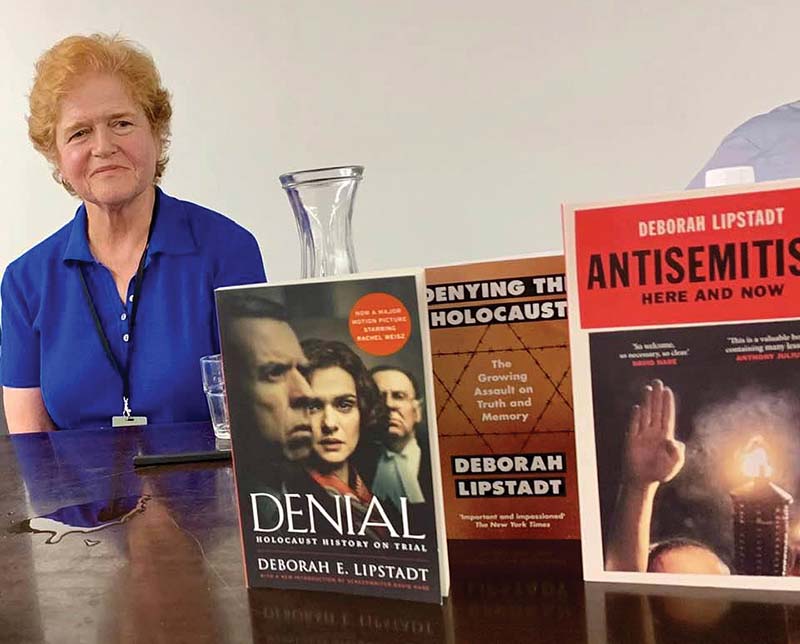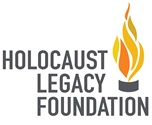by Michael Wittner
January 30, 2020

Deborah Lipstadt will address the North Shore via video conference later this year.
“It is hard, if not impossible, to explain something that is essentially irrational, delusional, and absurd. That is the nature of all conspiracy theories, of which antisemitism is just one,” writes historian Deborah E. Lipstadt in a letter to a fictional college student asking her a simple yet confounding question: “Why antisemitism?”
Lipstadt is a professor of Modern Jewish History and Holocaust Studies at Emory University. Her efforts to fight Holocaust denial were the subject of “Denial,” a 2016 film starring Rachel Weisz. She devotes an entire book to answering a question that seems to be growing more urgent with every passing day. In her 2019 book “Antisemitism: Here and Now,” Lipstadt writes a series of letters trying to explain anti-Semitism to two fictional characters asking her questions she’s heard in real life. Later this year, thanks to the efforts of a new Community Call to Action against Antisemitism organized by Rabbi Michael Ragozin of Congregation Shirat Hayam, Lipstadt will be able to answer the North Shore’s questions.
In response to growing anti-Semitism locally and worldwide, Rabbi Ragozin proposed a “community read” of Lipstadt’s book to his congregation on the High Holidays, and was met with enthusiastic response. A steering committee of concerned citizens and leaders from other synagogues, Combined Jewish Philanthropies, Epstein Hillel School, the Jewish Community Center of the North Shore, Lappin Foundation, the Holocaust Legacy Foundation and the Anti-Defamation League helped lay the groundwork for a series of small group discussions on the book throughout the North Shore and Merrimack Valley facilitated by trained leaders. Todd Ruderman and Jody Kipnis, leaders and founders of the Holocaust Legacy Foundation, purchased 500 books so participants could have the book for free. To thank them for their support, Lipstadt agreed to a videoconference Q&A with the whole community later this year.
Ragozin appreciated the book because of its innovative yet accessible way of answering a hard question. He felt it also helped him identify daily anti-Semitism in its subtler forms.
“One of the real challenges of addressing anti-Semitism and calling it out is being able to label it,” he said. “And a lot of things that were being reported in the media, I knew that I was offended by them, I knew that they were wrong, but I couldn’t tell you exactly why this was anti-Semitic, and that led to a sense of shame. I thought, ‘if I feel this way, other people will feel this way,’ and it’s one of the things holding us back as a community. I thought, ‘if we’re gonna accomplish anything down the line, let’s start with a project that allows people to develop an inner strength and confidence around understanding and identifying it.’”
Ragozin said that for the time being he is focused on making this first Community Read a success, but hopes this can evolve into a multipronged approach devoted to tackling anti-Semitism.
The program is open to the public. Those who would like to organize a group read, should email Lappin Foundation Executive Director Debbie Coltin at dcoltin@lappinfoundation.org with the name of a facilitator and a date in March for their discussion. Groups will then receive up to 15 free copies of the book.
Facilitators will attend a Feb. 26 workshop at the Brudnick Center for Living in Peabody, led by JCCNS president Izzi Abrams. Abrams, a Swampscott librarian who has organized many town-wide reads, says she’s looking forward to helping the community generate discussion about an important topic.
“I don’t want to be the teacher and say to them, ‘You must discuss x, y, and z.’ I want them hopefully to have read the book and come to my program and for us together to work on the kind of questions that would generate conversation so that people would really begin to talk about the essence of the book, and anti-Semitism, and the call to action,” she said.
